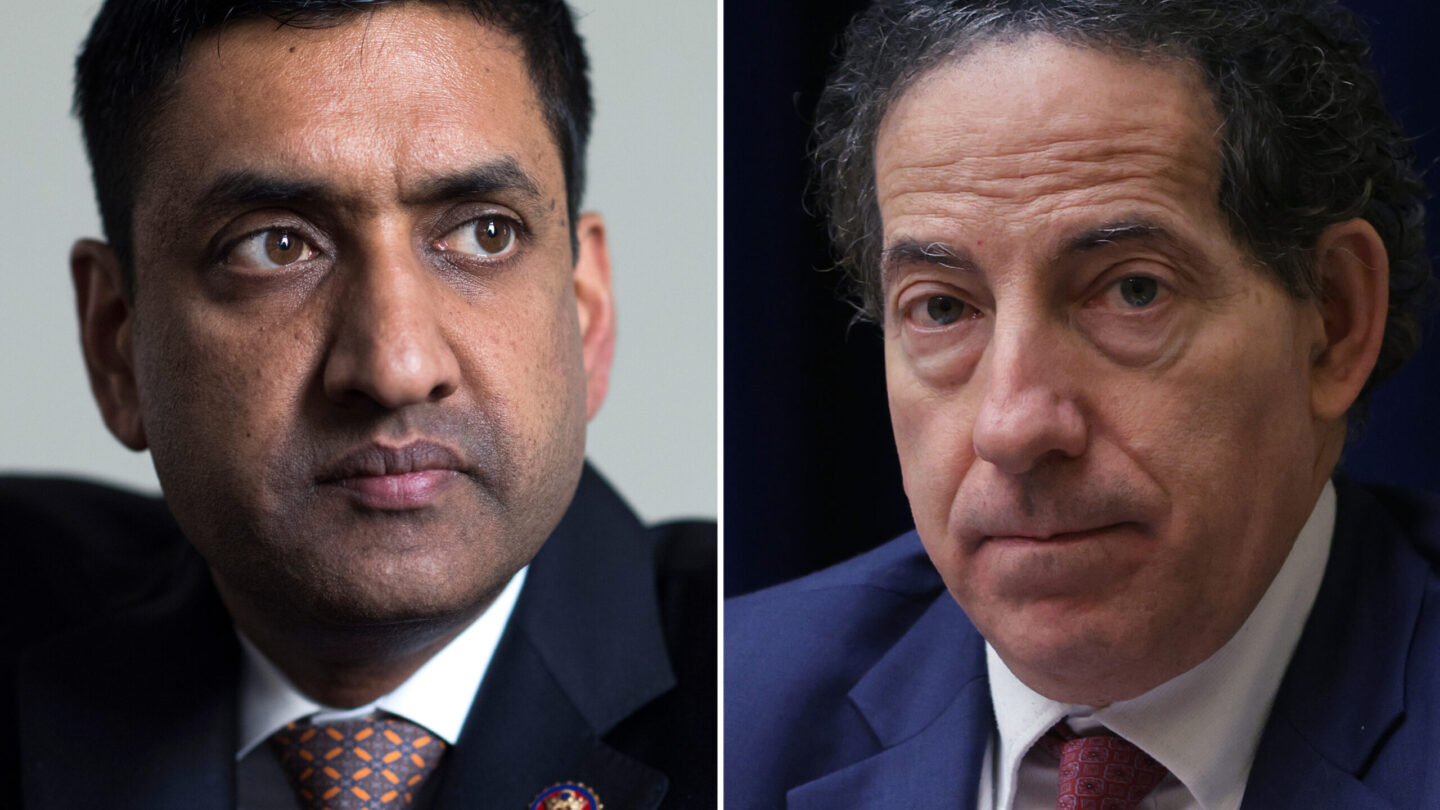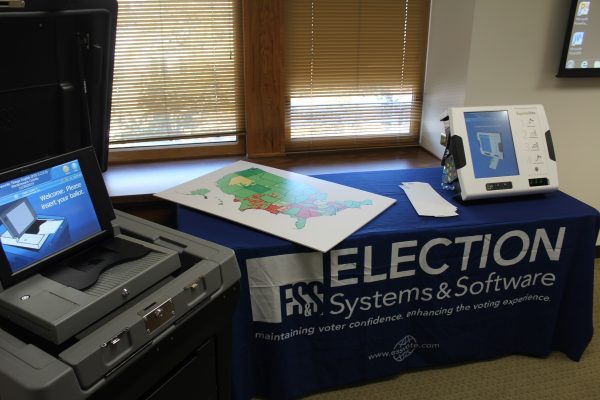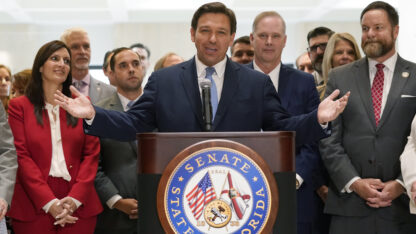Republicans are threatening to take over the House of Representatives in this year’s midterm elections. More than 30 House Democrats are heading for the exits. And progressives have seen several major legislative proposals stall out.
But two progressive lawmakers in the House, Democratic Reps. Jamie Raskin and Ro Khanna, say they’re developing a plan to turn around the cascade of bad news for their caucus.
Raskin of Maryland and Khanna of California tell NPR they’re on the ground floor of talks to fuel new victories for the party’s liberal wing.
“We need to defend American constitutional democracy with everything we’ve got at this point,” Raskin said from his office in the Rayburn House Office Building while seated next to Khanna. “And that calls upon us to be as ambitious as we can be in terms of reaching out to people all over America.”
Raskin and Khanna are trying to shake up discussions for the progressive caucus and the Democrats ahead of the midterms and map out a new winning strategy beyond.
They say this includes coalition-building, sharing a more optimistic message with voters and less preaching. Democrats should also reclaim issues of patriotism, stay out of the political correctness business and improve their dialogue on racial divisions, they said.
Khanna warns if the GOP does indeed take over the House next year, President Biden will be impeached and certain Democrats will be forced off committees. But Khanna is trying to stay optimistic they can defy the political handicappers.
“I think the polling is in a vacuum because elections are a choice,” Khanna said. “And I don’t think people fully have grasped the choice of what it means for the Republicans to actually win the House.”
Khanna also warned that the party’s more extreme wing, such as Reps. Marjorie Taylor Greene of Georgia, Lauren Boebert of Colorado and Madison Cawthorn of North Carolina, dominate the GOP’s voice.
As a result, Khanna says Democrats need to ramp up their reminders to voters that despite slim margins in the House and Senate, the $1 trillion bipartisan infrastructure plan and $1.9 trillion American Rescue Plan for pandemic relief.
For example, stalled talks on a top progressive priority, the Build Back Better plan, have given the impression that Democrats are in paralysis, but Khanna argues that’s not correct, either.
“Do I wish we could have gotten a little more done? Yes,” Khanna said. But he argues, “on the other side is a destruction of democracy. I think we have a fighting chance to defy the odds.”
‘We have a skepticism out there’
Khanna said their brainstorming sessions started after a phone call from President Biden into a closed-door Congressional Progressive Caucus meeting last October. Raskin made a poignant remark to the president.
“He got up and he said, ‘Yes, we’re all progressives, but we’re also Democrats. And most importantly, we have to recognize that the challenge against us is the return of authoritarianism and then that those are the stakes,'” Khanna said of his colleague.
Khanna and Raskin entered Congress at the same time in 2017, and both have raised their national profiles. Khanna is a Silicon Valley progressive, while Raskin was a longtime constitutional law professor.
Both have tired of the ideological purity politics that have overtaken Democrats’ message.
“I hear from Republicans frequently in my district who say they can’t take it anymore and they want to become Democrats, but they want to make sure that there’s a place for them in our party and I assure them that there is,” Raskin said.
Khanna said there are pockets of America that have been left behind that today Democrats are not reaching.
“And so we have a skepticism out there for a large part of the country that has fallen behind, that has lost jobs,” he said. “And when I or Jamie or someone up on TV saying, here’s what’s going to happen, there’s a skepticism, whether those communities, whether people feel like they’re going to benefit.”
Raskin and Khanna argue that former President Trump was able to encroach on what was traditionally Democrats’ turf — middle America — by speaking their language.
Still, voters have issues with both parties.
During a recent visit to Pennsylvania, Khanna said he learned about a focus group that characterized Republicans as “crazy” and Democrats as “preachy.”
Khanna and Raskin say that preachy tone has got to go, for example, when talking with voters about sweeping proposals such as Medicare for All.
“Preachy is to go on TV and say, ‘Well, if you’re not for Medicare for all, then you’re must be evil and you must want people to die and you must be wrong, right?'” Khanna said. “As opposed to saying, ‘Here is why we want to make the case for Medicare For All.'”
Khanna says Democrats can engage in more of a dialogue with voters and listen to their concerns. Still, he says progressives face a constant challenge along the way in asking the right questions.
“How do we get people on board with it? And how do we make sure that if we have to compromise on something that we get something done?” he said. “My view is we should be firm in our ideals. But then also pragmatic about what it’s going to take to move the ball forward.”
‘I love to call myself a conservative, too’
Raskin, who is also a member of the House panel investigating the Jan. 6, 2021, attack on the Capitol, argues the right wing is trying to demolish faith in the democracy.
And he says it’s time for progressives and Democrats to better defend against such Republican attacks.
So Raskin touts himself as a liberal — and a conservative.
“I love to call myself a conservative, too, because I want to conserve the Constitution and the Bill of Rights. the land, the air, the water, the climate system, the Voting Rights Act, the Civil Rights Act, the National Labor Relations Act, Social Security, Medicare, Medicaid,” Raskin said. “Everything that our friends across the aisle seem to want to be tearing down is everything that we want to conserve.”
Khanna said Trump has been able to capture patriotic rhetoric, but he and Raskin argue that Democrats need to take that talking point back from Republicans.
And this is also tied to issues of race, Khanna said.
“The idea that we would become this first major multiracial, multiethnic democracy in the world without conflict, I think is naive,” he said. “Trump is fighting for a parochial vision of American patriotism. The answer to that is not to shun patriotism, but it’s to offer the true version of American patriotism.”
Khanna also argues Democrats need to talk about race more candidly. For example, Democrats can address Republican attacks on critical race theory by addressing parents’ fears that their children are being taught to be embarrassed to be white and American.
“That’s really what that’s about. Now, I think we ought to say very clearly, ‘Look, some of our greatest leaders were white,'” Khanna said. “It doesn’t diminish a pride of being American or pride in being Caucasian to say there are things we’ve done in our country that are historically wrong, like slavery for 250 years and 100 years of Jim Crow.”
For his part, Raskin argued that the socialist label that a handful of members in Congress use can be misleading, and while popular for some circles of younger demographics, it hurts Democrats.
Through his Democracy Summer political fellowship program, Raskin tells students to aim for a new kind of PC, not political correctness but “political courage.” That is, he encourages them to talk to people with views that differ from their own.
“All of the political dogmas of the past are not serving particularly well, and we need to be opening up our minds to new interpretations of democracy,” Raskin said.
He said the GOP has gotten a jump on Democrats on some issues — and in some spaces on social media — and Democrats need to fend off attacks from what they call the “rule or ruin party” and invite all voters to join them, warts and all.
“What people say about the Democrats is, ‘You guys are too big and disorganized and chaotic. And what’s the message?’ and all that I hear, I agree with all of that,” Raskin said. “But that is democracy.”
“So we’re going to work it out,” Raskin added, “and we want people to come and join us and to be part of this big, sometimes messy conversation, but the conversation that’s actually moving America forward and making progress for the people.”
Copyright 2022 NPR. To see more, visit https://www.npr.org.
9(MDAxODM0MDY4MDEyMTY4NDA3MzI3YjkzMw004))

9(MDAxODM0MDY4MDEyMTY4NDA3MzI3YjkzMw004))








